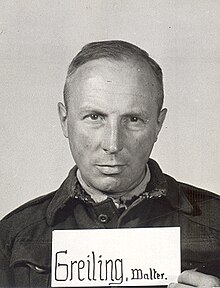Walter Greiling
Karl Walter Greiling (born September 5, 1900 in Weidenhausen , Hessen-Nassau , † 1986 in Neu-Isenburg ) was a German writer. Greiling was the author of numerous non-fiction books on developments in technology and science.
Life
Walter Greiling was a son of Landjägermeister Martin Greiling and Mathilde Werner. After attending school, he studied natural and social sciences in Frankfurt and Marburg. On August 22, 1922 , he received his doctorate as Dr. phil . In the 1920s and 1930s, Greiling worked as a miner in coal and sulfur ore mining. In 1922/1923 he also worked as an assistant at the Technical University of Hanover and from 1924 to 1928 as an employee at the Hamburg World Economic Archive and as editor of the economic service (1927/1928 main editor ). He then held office until 1931 as a consultant for the Central Association of the Chemical Industry in Berlin.
In the 1930s, Greiling became chief editor of the magazine Chemische Industrie , the organ of the chemical industry economic group. He achieved his first major journalistic success with the propaganda-tinged book Chemistry Conquered the World , which was reissued after the war in a denazified form by Econ. In the passages that were later criticized, he expressed National Socialist views related to the war events at the time: “Part of our superiority stems from what can be described with the words: total use of chemistry.” In his work, Greiling emphasized the importance of the “ Aryans “In the history of chemistry and in 1940 published an anti-Semitic essay on the role of the Jews in chemistry , in which he denied scientists such as Adolph Frank , Nikodem Caro and Fritz Haber their contribution to industrial progress. He was a member of the NSDAP and was mentioned as an SS Rottenführer in 1935 , but this cannot be proven in the SS lists of seniority .
After the war, Greiling took part as a witness in the trial against IG Farben as part of the Nuremberg Trials .
In the post-war period, Greiling intensified his journalistic activities. In addition, he conducted research in the field of agricultural microbiology and advised industrial companies. He also worked on the design of the Atomium for the 1958 World Exhibition in Brussels.
Further activities in an unknown order:
- Employee of the "London and Cambridge Economic Service"
- Head of the information service at the Central Association of the Chemical Industry (Berlin)
Greiling's predictions up to the year 2100
Greiling foresees the 20th century in the 1950s as a time in which at first thoughtlessly continued overexploitation of nature . He predicts that an international climate policy will be established from 1990 to 1995 and that shortly after the turn of the millennium, oil will suddenly become scarce for the first time, drastically and in a crisis. For the 21st century, he saw global cooperation in converting to organic raw materials, which, together with large projects to humidify the Sahara, Turkestan and other areas, will make it comparatively easy to feed ten billion people. He warns against using atomic energy and asks how the prosperity will be dealt with once the pressing technical problems have been resolved and there is a “creative break”.
Works
- Chemists fight for Germany . Wilhelm Limpert-Verlag, Berlin-Dresden 1940
- Chemistry is conquering the world . Econ-Verlag , Munich 1951
- 75 years of the chemical association . Kruse-Verlag, Frankfurt 1952, publisher: Association of the chemical industry
- Annihilation rays . Hoch-Verlag 1952
- How will we live A book about the tasks of our time . Econ-Verlag, Munich 1954
- Under the spell of medicine - Paul Ehrlich - life and work . Econ-Verlag, Munich 1954
- Chemistry, the engine of the future . Bertelsmann Verlag 1961
- More bread for more people . Franckh-Verlag 1963
- Chemistry and electronics are changing the world. Living with progress . Econ-Verlag, Munich 1971
Joint publications
- 75 years of Duisburger Kupferhütte 1876 - 1951 . With Kurt Horalek. Published by Duisburger Kupferhütte, 1951
- Carl Bosch . With Karl Holdermann. Econ-Verlag, Munich 1953
- Existential questions of industrial society . With Wolfgang Koeck. Econ-Verlag, Munich 1962
- Don't be afraid of tomorrow . With Wolfgang Koeck. Econ-Verlag, Munich 1985, ISBN 3-430-15541-X
swell
- About the person: blurb of How will we live? 1954
Individual evidence
- ↑ Greiling, Karl Walter. In: Degeners Who is it? Degener, Berlin 1935.
- ↑ Helmut Maier : Chemists in the “Third Reich”. The German Chemical Society and the Association of German Chemists in the National Socialist Ruling Apparatus , Wiley, Weinheim 2015, ISBN 978-3-527-33846-7 , pp. 131, 339.
| personal data | |
|---|---|
| SURNAME | Greiling, Walter |
| ALTERNATIVE NAMES | Greiling, Karl Walter (full name) |
| BRIEF DESCRIPTION | German writer |
| DATE OF BIRTH | 5th September 1900 |
| PLACE OF BIRTH | Weidenhausen , Hessen-Nassau |
| DATE OF DEATH | 1986 |
| Place of death | Neu-Isenburg |
